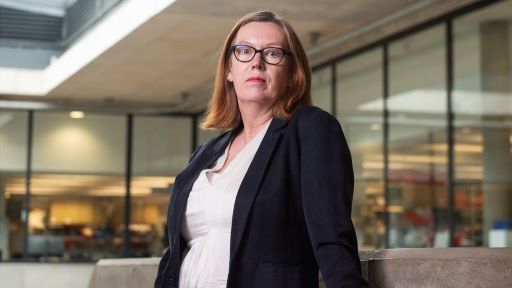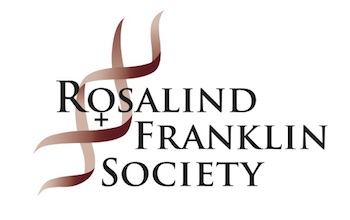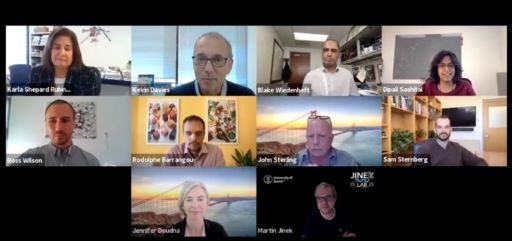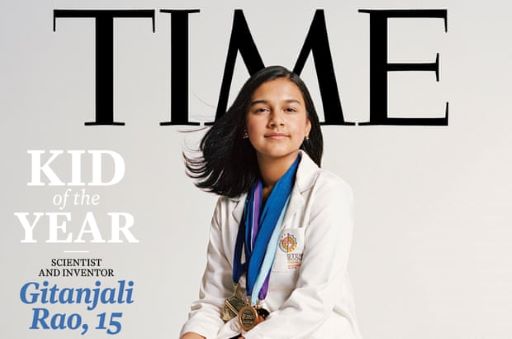RFS Briefings - December 8, 2020Dear Colleagues, I am pleased to include another issue of RFS Briefings with some timely and encouraging updates on women in science. We are happy to announce our end-of-year virtual meeting which will take place online over two half-days: December 16th and December 17th from 1:00pm to 5:00pm EST. The meeting “Labs, Leaders, Critical Connections” will highlight astounding accomplishments of women and minorities in science as well as significant challenges yet to be addressed. From groundbreaking research to prestigious awards and recognition, this free virtual event provides you with incredible access to emerging stars as well as those who continue to lead the way.  Sessions will cover the academic world as well as industry; corporations and start-ups; and U.S. and international colleagues and partnerships. Thank you to Mary Ann Liebert, Inc., publishers, Genetic Engineering & Biotechnology News (GEN), and Onramp Bioinformatics, Inc for supporting our meeting! Register here. Jennifer Doudna PhD, the UC Berkeley biochemist who shared the 2020 Nobel Prize in Chemistry with Emmanuelle Charpentier PhD, was the recent guest of honor for the final episode in the “Women in Science” web series, co-organized by GEN and the Rosalind Franklin Society. Doudna discussed a broad range of topics, including how to celebrate a Nobel Prize in a pandemic, what the award means for women in science, her views on mentorship, and her decision earlier this year to launch a high-throughput COVID-19 diagnostic lab.
Please continue to share important news and opportunities with us so that we may share it with you and others who are committed to supporting the careers of exceptional women in science. With regards in these trying times, Karla Shepard Rubinger NewsThey Made the ‘Pfizer Vaccine’. Dr. Ozlem Tureci and Dr. Ugur Sahin, the co-founders of BioNTech, are the husband-wife team who are behind the first coronavirus vaccine to be approved in the West. This week, the “Pfizer vaccine” will be available in Britain. BioNTech started working on a vaccine in January. By early November, the company shared the results of its Phase 3 trials: over 90 percent efficacy. Risa Lavizzo-Mourey Elected as HHMI Trustee. Risa Lavizzo-Mourey, MD, MBA, University of Pennsylvania professor, and former president and CEO of the Robert Wood Johnson Foundation (RWJF), has been elected a Trustee of the Howard Hughes Medical Institute (HHMI), the largest private biomedical research institution in the United States. Her appointment will begin on January 1, 2021. Gwynne Shotwell, New Space editorial board member, was featured as one of Time’s collection of one of the 100 most influential people in 2020. “Gwynne Shotwell is living proof that you don’t need a space suit to be a space pioneer. Itching to build something after a decade’s work in the policy and analytical segments of the space sector, she jumped into the fledgling commercial space arena, becoming one of SpaceX’s earliest employees in 2002.” L'Oréal Canada holds the 18th edition of the Canadian Awarding ceremony of the L'Oréal-UNESCO For Women in Science fellowships and recognizes Canada's Top Rising Stars of science. "Never has science been more vital. This challenging year has certainly put a spotlight on the importance of science and research scientists in supporting our world's wellbeing. More than ever, the world needs science and science needs women," said Frank Kollmar, President and CEO of L'Oréal Canada, in his opening remarks. UNESCO and Foundation L’Oréal recognize 20 young women scientists in Sub-Saharan Africa. Since 2010, this joint initiative rewards twenty women scientists each year for the excellence of their work, and supports them to pursue their research through grants of €10,000 for PhD students and €15,000 for post-doctorates. Dr. Mary Fowkes, a neuropathologist at Mount Sinai Hospital in Manhattan died on November 15 at her home in Katonah, N.Y., in Westchester County. She was 66, according to the New York Times. Dr. Cordon-Cardo, chairman of the department of pathology, molecular and cell-based medicine at the Icahn School of Medicine at Mount Sinai, said that the findings from the autopsies of Covid-19 patients done by Dr. Fowkes’s team had led to an aggressive increase in the use of blood thinners, resulting in a marked improvement in the health of some patients. Women in STEMProf Sarah Gilbert: The woman who designed the Oxford vaccine. Prof. Gilbert describes the Oxford coronavirus vaccine as “a series of small steps - rather a big breakthrough moment.” "From the beginning, we're seeing it as a race against the virus, not a race against other vaccine developers," she said earlier this year. "We're a university and we're not in this to make money."  Prof Sarah Gilbert. Image: John Cairns, University of Oxford.
Gitanjali Rao: Time magazine names teenage inventor its first ‘kid of the year’. A 15-year-old scientist and inventor has been named as Time magazine’s first “kid of the year”. In an interview with actor and humanitarian Angelina Jolie, Gitanjali said: “I don’t look like your typical scientist. Everything I see on TV is that it’s an older, usually white, man as a scientist.
How mRNA went from a scientific backwater to a pandemic crusher. For years, Katalin Karikó's work into mRNA therapeutics was overlooked by her colleagues. Now it's at the heart of two leading coronavirus vaccines. Karikó has been at the helm of BioNTech’s Covid-19 vaccine development since 2013, when she accepted an offer to become Senior Vice President at BioNTech. Kate Marvel: “With science plus action, things can get better.” “We can shape the future that we want.” Kate is the latest member of the Inverse Future 50, a group of 50 people who will be forces of good in the 2020s, and her message is that we can still fight off the worst of climate change. Asifa Akhtar is a sign of new things to come at the Max Planck Society. In July, the Pakistan-born molecular biologist became the first international woman to be named vice-president of the Max Planck Society’s Biology and Medicine Section. According to an article in Nature, a key focus for Akhtar in her new position is ensuring a more diverse cohort of young researchers sits at the forefront of German research. “I’m aware of the responsibility on my shoulders and I take it very seriously,” she says. “I want to show that there are role models who can push things forward.” Special Reports 2020's Fiercest Women in Life Sciences. 2020 has seen women make tremendous gains at the top, with Kamala Harris becoming the first female vice president-elect and, on the biopharma side, Reshma Kewalramani ascending to the CEO spot at Vertex Pharmaceuticals, according to Fierce Pharma. Leena Tripathi uses CRISPR gene-editing technology to protect bananas and other staple crops across Africa against killer pathogens. For more than two decades, Leena Tripathi has been working to improve several staple food crops in Africa, including bananas, plantains, cassavas and yams. As principal scientist and a plant biotechnologist at the International Institute for Tropical Agriculture in Nairobi, she aims to develop varieties that are resistant to pests and diseases such as bacterial wilt, Fusarium wilt, and banana streak virus. Teen Vogue’s 21 Under 21, 2020: The Girls and Femmes Building a Better Future. Meet Anika Chebrolu, a 14-year old Texan and a scientist. Earlier this year, she won the 3M Young Scientist Challenge for creating a possible cure for COVID-19. "To all other young girls who want to make a difference, I hope you all understand how important you are to this world! Do not let society’s standards hold you back from reaching your full potential,” she says. STEM superstars call for more gender and cultural diversity. Associate Professor Kim-Anh Le Cao, astrophysicist Clare Kenyon, Dr. Kylie Soanes, Dr. Maria del Mar Quiroga and Priyanka Pillai have been named Australia's official Superstars of STEM by Science and Technology Australia. "My mission is to get people excited about urban nature," said conservationist biologist Kylie Soanes. "I have always loved sharing stories about science and nature with people. My research has enormous potential to engage broad audiences in science and nature conservation and I'm willing to step up and advocate for issues that are important." UWA scientists named among Australia's superstars of STEM. A biotechnologist from The University of Western Australia who maps genomes of threatened animals to support Australian biodiversity and conservation has been named a superstar of STEM by Science & Technology Australia. IdeasAccording to the article “Women Physicians and Promotion in Academic Medicine,” over a 35-year period, women physicians in academic medical centers were less likely than men to be promoted to the rank of associate or full professor or to be appointed to department chair, and there was no apparent narrowing in the gap over time. The Curie Society aims to broaden perceptions of STEM female protagonists. “The Curie Society is a teen spy thriller centred around a team of brilliant women scientists. Our base mythology envisions a society founded by Marie Curie with her Nobel Prize winnings, with a mission of supporting the most brilliant female minds in the world. But due to the politics of her time, she kept the society underground so it couldn’t be corrupted by the same scientific patriarchy that she constantly had to deal with. In the modern day, the society has grown to have secret chapters at universities all over the world, and its members are always on the lookout for the best and brightest students to join their ranks,” says Heather Einhorn, founder of Einhorn Epic Productions. The researcher fighting to embed analysis of sex and gender into science. Accounting for sex and gender differences should be mandatory in all research areas. "It's not about women — it’s about getting the research right," says Londa Schiebinger. Recalled drugs, unsafe products and even environmental chaos are just some of the consequences of research that doesn’t consider sex and gender, she says. Perceptions of stereotypes applied to women who publicly communicate their STEM work. According to a study, systematic cultural and institutional change is needed in STEM fields to address the underlying bias and negative stereotypes facing women. However, it should be ensured that the intended solutions to facilitate this change are not compounding the problem. The stress of being a young, female scientific expert during Covid-19.“It is hard enough to be on the public stage trying to explain your complicated scientific expertise to the general public when some of them don’t even believe the information, but is an added burden when you are a woman and that comes with death threats and harassment.”
Marianna Limas, Social Media Manager |


